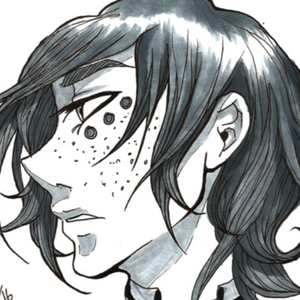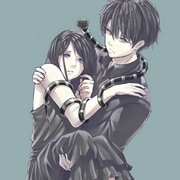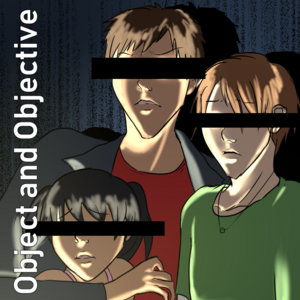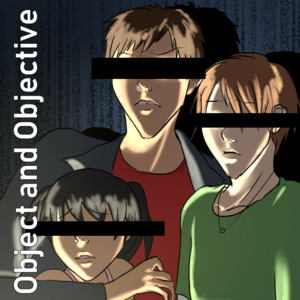He was blind.
Abel fought the gut-deep panic that burst through his whole body and threatened to drive him to his knees. They’d been caught. All their planning, sneaking onto the train, running, hiding—all of it was for nothing.
Unless Dad came.
That slim thread of hope was the only thing keeping him standing right now. That, and the fact that when he strained his ears, he could hear Evie’s semi-whimpering breaths and Wes’s heavier, pain-laden ones just behind him. The rough hands of his captors kept him moving too fast to stop and listen closely enough to make sure they were okay, but at least he knew they were nearby.
Police sirens filled the air. He could hear the screech of tires and the dying ‘BWOO-BWOO’ as they swung into the adjacent street where the bus had been. Even if he started screaming for help now, it would just be drowned out—and might earn him a knock to the head. He didn’t want to imagine how much more scared Evie and Wes would be if he was unconscious. For the moment, staying quiet would keep his siblings safe.
Dad, please hurry, Abel thought.I did everything I could, and we still got caught. I’m sorry. Please come.
They shoved him along the pitted old road, blind except what he could feel through his sneakers, and the only thing he could think about was his promise.
***
It had been different when his friends’ family members went to the battlefront. He was only a bystander, just far enough removed to feel a sense of vague, detached fear that one day that person—whom he didn’t really know—might not come back. A vague, detached fear that one day, his friends wouldn’t show up to school, only for him to find out the next day that their father or mother or sibling had died. He’d dreaded being that bystander. He didn’t have the first idea how to comfort anyone, and losing a family member was the worst possible tragedy he could imagine.
But it was still vague, and it was still detached. As long as it stayed that way, he would be fine.
Then came the day Mom and Dad sat them down in the living room.
The kids lined up side-by-side on the couch, sitting with their lips pressed together and their eyes darting between the parents sitting across from them, a sliver of nervousness piercing them all because their family never sat down like this. Their only precursor had been a serious ‘we need to tell you something.’
Abel’s first thought had been a simple but horror-stricken ‘DIVORCE,’ but then he saw Mom and Dad were holding hands—Mom’s slim, pale one resting in Dad’s rougher, larger one just like when the family took a walk. A short-lived relief poured over him.
Mom started talking.
The words went right over Abel’s head at first. He swallowed hard and almost asked her to repeat it, but he knew what he’d heard. He was fourteen now. He understood what was going on. Thinking back on it, he’d even had a suspicion for a few days, since he’d spotted Mom and Dad speaking quietly to each other late every night for the whole week. He just hadn’t thought the problem would be so vast.
Evie, however, wasn’t so receptive.
“What?” she asked.
“I’m going to the outer sector,” Dad repeated. “The army. I’ve joined, and they’re sending me to do border patrol around the far Earthian defenses.”
There was a pause.
“When… did you join?” Abel asked.
“I’ve been working through the process for a couple weeks now,” Dad said. “And I’ll be heading out in a month or two once they get all the paperwork filed. I know it seems sudden, but that’s how it happened.”
The kids sat in stunned silence for a few seconds before Wes burst with a shout.
“What about boot camp?” he asked. “Don’t you have to do training first?”
“It will take place on the front,” Dad said.
Mom tightened her grip on his hand. She had already started to thin out back then—the first signs of sickness that nobody realized.
“It won’t be long,” Mom said in a reassuring voice. “And he’ll get to come back periodically, won’t you, hon?”
“Yes,” Dad said. “And besides, the front is quiet. It always has been. This is just a precaution. They want to put more patrol soldiers out there so other civilizations know they’re well-protected.”
“But what if they attack anyway?” Wes asked.
“They won’t,” Dad said.
“Who will attack?” Evie asked, sounding scared.
Dad sighed. “No one. It will be perfectly safe.”
Wes stood up. “If it was safe, why would they need more people?”
“Honey, sit down,” Mom said. “Everything’s going to be fine.”
“Like hell it is!”
“Wes!” Mom snapped. “You watch your language.”
“Hey, there’s no need for that,” Dad said. “Listen, I promise you it’ll be okay.”
Abel hadn’t moved from the couch. He crossed his arms and sat back, watching his parents argue with and try to console Wes, who, Abel could tell from the rising pitch in his voice, was terrified. Wes had a friend—one friend, finally—whose dad went to war and never came back. He’d been frightened ever since.
Evie started crying, which was inevitable. Abel would have comforted her, but she was already off the couch and hugging Mom before he could even unfold his arms. He watched the rest of his family, feeling, for a moment, still detached. It was like listening to his friends talk about their family members instead of having to watch his own fall to pieces. Maybe he was still removed just enough. He thought maybe he’d pull through this.
Two and a half months later, they stood at the base of the starship station tower and watched Dad sling his loaded backpack onto a hover transport with the rest of the soldiers’ luggage. Around them, dozens of other families stood huddled in little packs, all crowded around the one uniformed figure in the center. The sky was low and gray, threatening to rain at any second. The worst part was, it obscured the tip of the tower. Abel knew the second the ship passed through the clouds, that would be it. For years. And the clouds were so close.
“Hey kiddo, stop crying,” Dad said, leaning down to pick up Evie.
She was a blubbering mess, but nobody could blame her. Every child her age in the whole loading port was crying. Wes was doing a little better. He was eleven, but every time he glanced around him—or at the tower—glistening tears would pool on his lower eyelids, too. Abel felt prickles behind his eyes and a burning in his nose every few minutes, but he took long, deep breaths to quell it before it started. He didn’t want to look like a baby in front of all these people.
Mom was holding up well, he thought. She was smiling and even laughing when Dad made a crack about her having to fill his excellent school-lunch-packing shoes. Every couple minutes, though, she would put her arm around Abel’s and Wes’s shoulders and pull them close for a side-hug. Dad hugged Evie first, then Wes, then Abel. It was a long hug. Tight, too—unlike his other hugs when he saw the kids off for school or got back from work.
Dad pulled back and held Abel at arm’s length.
“Abel,” Dad said. “You know what I’m going to say, don’t you?”
“I think so,” Abel said. He had to fight to keep his voice from quivering.
“You’re smart,” Dad said. “Practically a genius. Your Mom and I have no idea where you got it from.”
“Dad…”
“And that means you’re more than capable of being the man of the house while I’m gone. I mean, you’re fourteen now. That’s all grown up, isn’t it?”
Abel would have rolled his eyes if this had been any other situation. Instead, he set his jaw and nodded.
“I trust you to look after them,” Dad continued. “Watch after your siblings and your mother for me, will you?”
“I will,” Abel whispered. “I promise.”
“Good. You’re a strong kid. You’ll do just fine. I know you will.”
Dad reeled him back in for another hug. This one was shorter. When he was done, he clapped Abel on the shoulder and gave him a smile that said everything: Dad trusted him. Dad knew he could look after the family. Now, it was his responsibility.
Then Dad turned to Mom, and they began their goodbyes. Long, slow kisses. A close embrace. Abel stopped watching and went to where Evie and Wes were watching someone cart away the hover transport. The sky seemed even lower than it had before, if that was possible. The wind had turned cold—it carried a few stray droplets and brushed them into Abel’s eyes. He wiped them off with his sleeve.
Abel put an arm over Evie’s shoulders. She leaned on his side.
“Will Daddy ever come back?” she asked.
“Of course he will,” Abel said.
“You can’t promise that,” Wes said.
Abel elbowed him. “Dad said he would. I believe him. And besides, he was right about the border patrol. Nothing ever happens out there. It’s almost in deep space. He’ll be fine.”
“Okay,” Evie murmured.
The speakers blared ‘SHUTTLE E.D. 90-C DEPARTING, LAST CALL’ and Dad was suddenly giving them all a final hug. The whole port sprang to life as all the families and soldiers parted like an unwilling but powerless ocean. Adults were stifling sobs behind clasped hands and little children were outright bawling. Evie joined in, but at least she buried her face in Abel’s jacket. He hugged her with one arm and used the other to wave wildly at Dad as he stepped onto the shuttle ladder.
“Bye!” Abel yelled, his voice mingling with the chorus of everyone else shouting the same thing.
Ten minutes later, the shuttle took off. Everyone watched it ride the tower scaffolding hundreds of feet up before engaging its engines and booming away into the upper atmosphere. It passed through the clouds in a matter of seconds. Abel didn’t dare blink. He watched until the last plume of white smoke faded into the sky, dissipating into just another layer of dullness.
Dad was gone.
He promised he’d keep them safe.
***
And now Dad’s return, after five years since his first deployment and two since his last visit, was their last chance of ever seeing home again.
Abel's brain cried out. I’m sorry. I tried so hard, I really did.











Comments (4)
See all